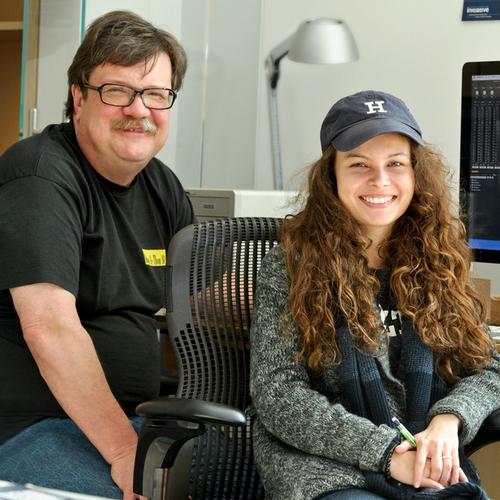Documenting Utica’s refugee community

The city of Utica boasts on its website that it is “the cultural melting pot of upstate New York, with over 40 languages and 50 nationalities represented.” Among the city’s 61,300 or so residents is a relatively large number of refugees, and in 2013, Erol Balkan, professor of economics, and Patricia O’Neill, the Leonard C. Ferguson Professor of Literature and Creative Writing, had the idea of engaging with that community in some way.
The Refugee Project was the eventual result. It is an evolving online documentary archive, a collaborative effort of Hamilton faculty, students and the Digital Humanities Initiative (DHi). Utica’s refugees, from well-established business owners to young new arrivals, have contributed by sharing their stories and perspectives. Over the years project partners have included the Levitt Center and the Mohawk Valley Resource Center for Refugees. Thus far the project consists of two videos, roughly 50 oral history interviews and a developing archive of mostly local newspaper articles. One video focuses on long-settled Bosnian refugees who fled their country to escape the war of the early and mid 1990s. The other features a more recently arrived group — Karen refugees from Burma.
The next phase of the project will be an online interactive map. John Bartle, a project director and associate professor of German and Russian languages and literatures, Jackie Rodriguez ’18 and the DHi are working to incorporate the oral histories, newspaper stories and other information into a searchable map. The long-term vision is for the Refugee Project to live on, expanded by the research of faculty and students from a range of disciplines. Scholarly interest in the refugee experience is growing, and the subject is at the intersection of urban studies, cultural studies, anthropology, linguistics and other disciplines, Bartle says. He became interested in refugees because they are his neighbors in Utica. He’s seen how they’ve contributed to a city that had struggled with a dwindling population.
“Each year of the Refugee Project has benefited from the work in the previous year but has also taken on a unique component driven by the voices of the refugee community that year,” says Janet Simons, another project director and co-director of the DHi. “All of our DHi research projects are developed to be evolving, collaborative digital scholarship.” Rodriguez is working on the project as a DHi scholar; five DHi student interns have contributed, too. Other project directors are Chaise LaDousa, associate professor of anthropology, and David Chanatry ’80, director of the New York Reporting Project at Utica College.
The database of newspaper articles now totals about 450 published between 1993 and 2000. Six students, plus Bartle and LaDousa, spent much of the summer of 2014 collecting them. It wasn’t glamorous work. Most are from the Utica newspaper, the Observer-Dispatch, and the Hamilton crew searched manually through microfilm to find them. That same summer the project team also conducted interviews, observed English as a second language classes and tutored refugees.
Students who’ve worked on the project have developed interview questions, conducted and transcribed interviews, shot and edited video, and identified emerging themes from the interviews. “These students learn collaborative research methods along with the digital technology skills they will need as 21st-century citizens and scholars,” Simons says.
For Rodriguez, the cultural, religious and human aspects of the work complement her academic interests. She’s a government major and an anthropology minor who plans to attend divinity school after Hamilton. “Just bringing very political issues to a human level is what has interested me and impacted me through the work I’ve done so far,” she says.
— Maureen A. Nolan
